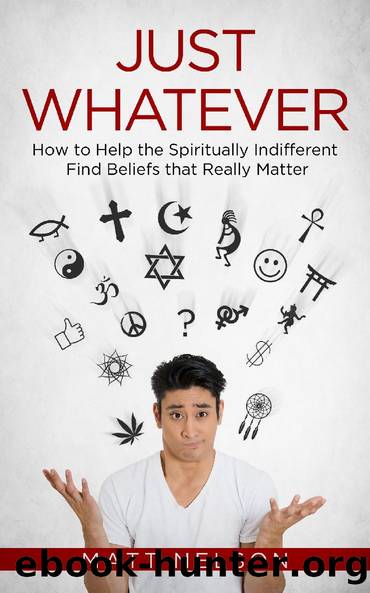Just Whatever: How to Help the Spiritually Indifferent Find Beliefs that Really Matter by Nelson Matt

Author:Nelson, Matt
Language: eng
Format: epub
Publisher: Catholic Answers Press
Published: 2018-09-09T00:00:00+00:00
7
Jesus and the Gospels
“You take too many things for granted! You can’t start with God. I don’t accept God!” These were the words of twenty-one-year-old C.S. Lewis to his friend, Leo Baker, shortly after the Second World War. Both Lewis and Baker had been commissioned officers and wounded in action, and were equally convinced of their opposite positions on God’s existence. Baker recalls130 another time when he asked his feisty atheist comrade whether he was afraid while fighting in France, to which Lewis replied, “All the time, but I never sank so low as to pray.”
At the height of his atheism Lewis found himself a lowly victim of something akin to the “unyielding despair” once described by Bertrand Russell. “Nearly all I loved I believed to be imaginary,” wrote Lewis, “[and] nearly all that I believed to be real, I thought grim and meaningless.”131 Clearly, at that point it might have seemed to Lewis’s peers that a conversion to Christianity was next to impossible. But Lewis not only became a Christian; he also became one of the most influential Christian apologists of the twentieth century. In Surprised by Joy, Lewis recalls how, as he began to take religion more seriously, he deliberated over which religion might be the true one. It came down to Hinduism and Christianity. Eventually he accepted Christianity over the former. The decisive consideration was the overpowering personality of Jesus Christ.
Every religion in some way brags of its affiliation with some highly significant personage, whether it be a founder, prophet, or sage. Buddhists have Buddha, Muslims have Muhammad, Hindus have Gandhi, Jews have Abraham. What makes the Jesus of Christianity tower above these? First, he was a worker of miracles:132 he multiplied bread and fish, calmed storms, read minds, read hearts, walked on water, cured illnesses, resuscitated the dead—and rose from the dead three days after being brutally tortured and executed. Second, he claimed to be on equal footing with the creator of the universe; he was the only founder of a world religion who claimed to be God. At least that’s what the Gospels tell us. But can we trust the Gospels?
A quadrilemma
Religious skeptics, critics, and indifferentists toward Christianity rarely cast Jesus in a bad light; to the contrary, they usually credit him with being a wise man or moralist. This was even the case during the strongly antireligious Enlightenment. In his seminal study At the Origins of Modern Atheism, the Jesuit theologian Michael Buckley notes:
In the Enlightenment the distinction [was made] between Christianity and Christ. . . . No one denied the moral genius of Christ. . . . The Enlightenment agreed that Jesus was a Jewish ethical preacher, still illuminating a world in which tradition and Church had distorted his beliefs and maxims beyond recognition.133
This peculiar tendency to reduce rather than reject Jesus persists today. No person, however, can call Jesus a mere wise man or moral teacher and stop at that, no matter how great they say he was. The Gospels are clear:
Download
This site does not store any files on its server. We only index and link to content provided by other sites. Please contact the content providers to delete copyright contents if any and email us, we'll remove relevant links or contents immediately.
The 5 Love Languages: The Secret to Love That Lasts by Gary Chapman(8497)
The Space Between by Michelle L. Teichman(6088)
Assassin’s Fate by Robin Hobb(5237)
Wiseguy by Nicholas Pileggi(4586)
Everything Happens for a Reason by Kate Bowler(4067)
Gerald's Game by Stephen King(3918)
A Simplified Life by Emily Ley(3572)
The Power of Positive Thinking by Norman Vincent Peale(3449)
Pillow Thoughts by Courtney Peppernell(3397)
Resisting Happiness by Matthew Kelly(2887)
Girl, Wash Your Face by Rachel Hollis(2821)
Being Aware of Being Aware by Rupert Spira(2706)
Name Book, The: Over 10,000 Names--Their Meanings, Origins, and Spiritual Significance by Astoria Dorothy(2490)
Real Sex by Lauren F. Winner(2474)
More Language of Letting Go: 366 New Daily Meditations by Melody Beattie(2444)
The Holy Spirit by Billy Graham(2418)
Fast Facts on Defending Your Faith by John Ankerberg & John Weldon(2388)
Victory over the Darkness by Neil T. Anderson(2386)
The Secret Power of Speaking God's Word by Joyce Meyer(2253)
